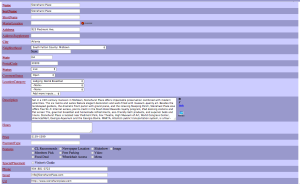Hannah Silvers ‘17 – ENG, PWR and CRW Major
Hello all! I’m Hannah Silvers, a rising sophomore English major with concentrations in PWR and Creative Writing and a minor in Economics. I’m an Honors Fellow at Elon and a copy editor for The Pendulum, our student newspaper. This summer, I worked as the operations intern for Creative Loafing, a multimedia company whose alternative newsweekly paper boasts the second-widest circulation in Georgia. I worked with former operations editor and current managing editor of Creative Loafing, Alicia, and my internship mentor, Dr. Rebecca Pope-Ruark. “Operations” entails a host of different responsibilities, among them event database management, fact checking, copy editing, and even a little bit of writing. In this blog post, I’ll run you through two of the typical work assignments for a Creative Loafing operations intern and the rhetorical skills that come along with them. For a discussion of two more, see my post next week!
Event database management
My biggest responsibility as operations intern is the events database. Creative Loafing (I’ll just refer to the company as “CL” from now on) has a reputation as a source for Atlantans to keep up to date on the diverse happenings of the city, both in the print edition and on the massive events section of the website. In order for CL to keep its followers in the loop, someone has to keep track of all the events going down in Atlanta and enter them into a giant online database that connects to the back end of the website. That’s the job of the operations editor and, this summer, me.
Hosts and sponsors of events email their press releases to Alicia. She then forwards me the ones that aren’t spam for me to enter into the database. Data entry is pretty simple, although it requires patience, attention to detail, and resourcefulness. I have to make sure that all the relevant information makes its way into the event entry. That means scrutinizing the press releases and often researching to fill in missing information. The tone, content, order, and format of the information in each entry has to match the others, which entails a rhetorical analysis of each.
Fact checking
After event database management, the next biggest responsibility of a CL operations intern is fact checking. Fact checking is important to any publication that doesn’t want to get in trouble for reporting false information or being careless. In the course of my internship so far, I have fact checked articles, blurbs, location profiles in our database, and parts of special projects like the CL City Guide (a kind of encyclopedia of what you need to do when you visit Atlanta: music festivals, Atlanta food, special bed and breakfasts, quirky boutique shopping… everything).
Fact checking can be tedious, especially when faced with a list of thirty hotel entries for the Lodging section of the City Guide that require address, phone number, price range, URL, a paragraph of description, and a host of other information. It can seem like mindless work. But when something goes wonky, fact checking turns into a rhetorical exercise.
My work with the Lodging section of the City Guide turned into rhetorical exercise. I ran into a problem almost immediately after starting on the project. Although Alicia told me that each of the entries was complete and only needed to be checked for accuracy, I quickly discovered that most of the entries were far from complete. All of them were missing any kind of information about price, and most of them were missing the paragraph of description that will feature as their blurbs in the City Guide. This isn’t too uncommon though as the editors tend to work a couple of weeks ahead of the staff; I just happened to be the first one to need the information that wasn’t there yet.
After realizing that the entries were incomplete, I decided to go straight to Alicia, let her know what the problem was, and offer to take on some extra responsibility with the Lodging section. I offered to help compose the descriptions and fill out the empty boxes, instead of just emailing her a list of missing information for someone else to compile. The decision to go to her and say what I did was rhetorically informed: I knew that she had given me a fairly specific task and I was asking to do something different, but I also knew that she is always eager to let me contribute because it helps me learn. Had the situation or person been different, a different approach would have been more appropriate.
In conclusion…
As someone who came from an English background, not a journalism background, database management and this scale of fact checking were new for me. I had experience with writing and copy editing (which I will discuss in Part 2), but I had limited experience with fact checking and no experience managing an online database. I didn’t really know what to expect with that sort of work. Luckily, I figured out early on that admitting my inexperience and being unafraid to ask lots of questions went a long way in helping me adjust to the new work. Alicia and the rest of the editorial staff were happy to help me navigate the database and give me tips on how to expedite my research when fact checking. Part of being a professional writer is knowing when and how to ask for help. I would advise any PWR majors or PWS minors who find themselves faced with brand new types of work to reach out to their supervisors. Chances are they’ll be happy to help.
Thanks for sticking around ‘til the end of my blog post!


 Follow
Follow